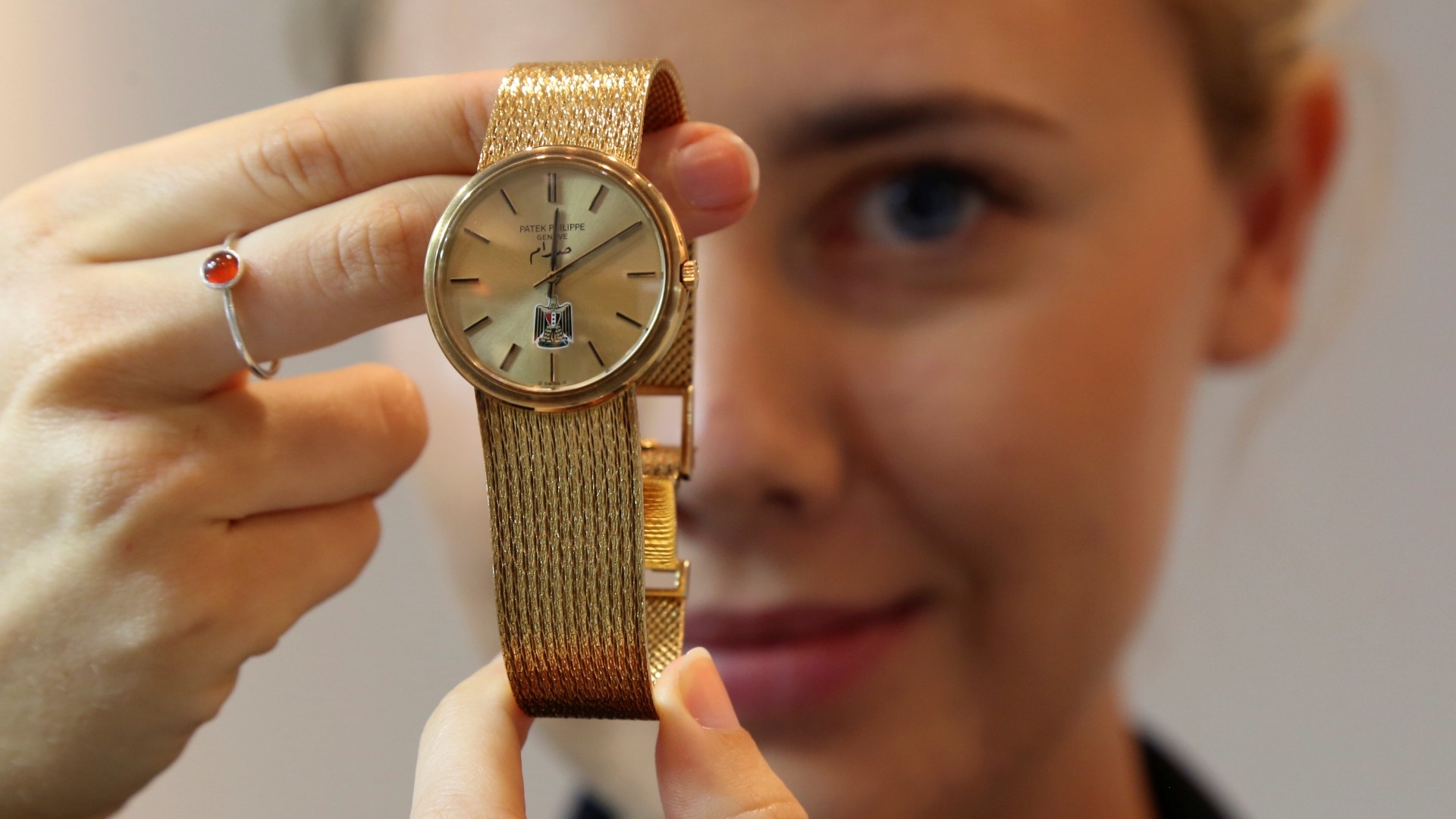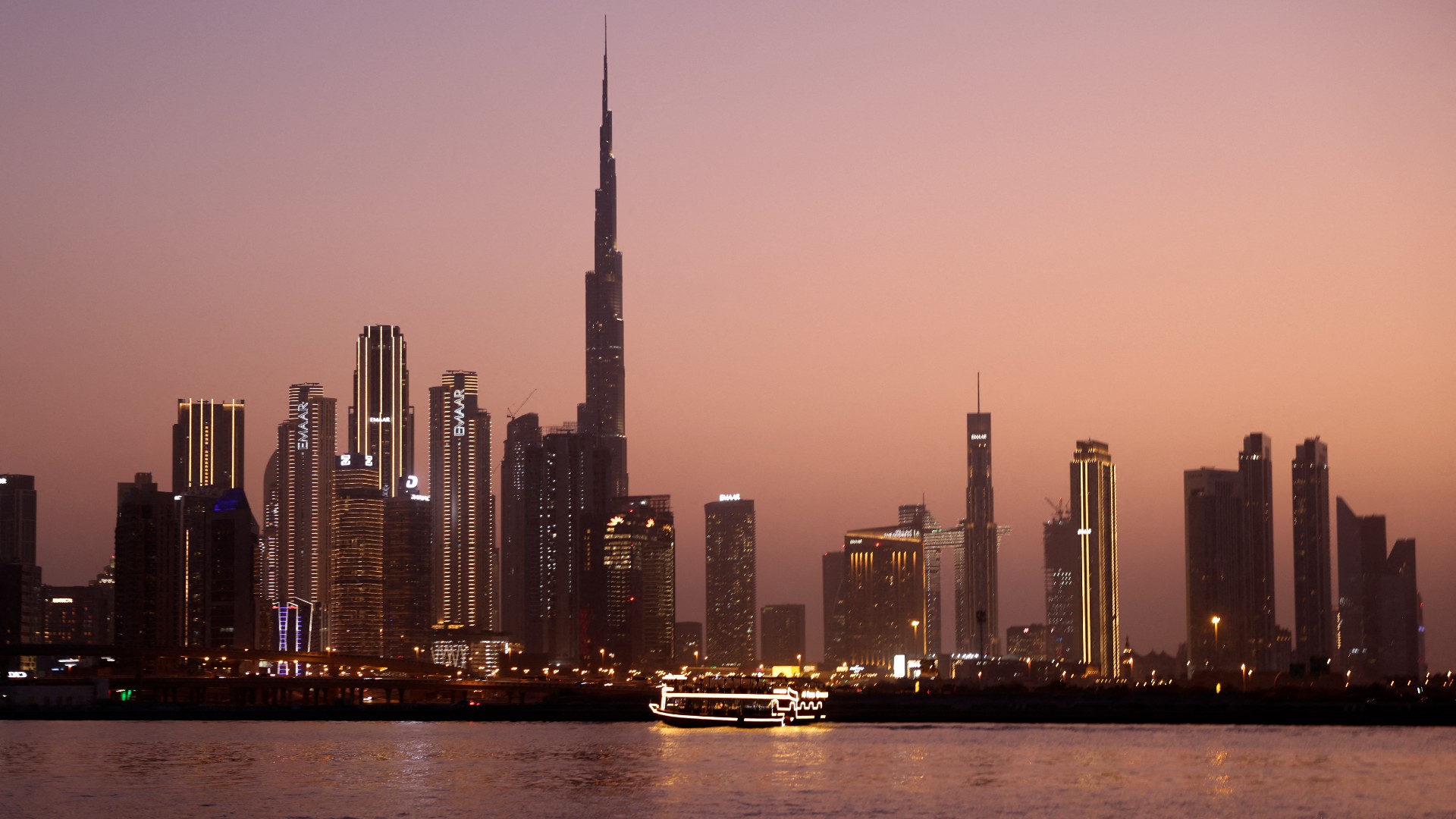Inside Dubai's cut-throat luxury watch industry

On a breezy early December evening, a group of young men in their 20s and 30s sit at an Iraqi restaurant in Dubai's Palm Jumeirah island. Though it has a perfect view of the Atlantis, one of the men isn't looking towards the towering resort, or even the World Cup match playing on a large screen.
Instead, he's fixated on the screen of a phone belonging to a middle-aged man seated at a table directly in front of them.
"He's looking at Chrono," the young man says to his shisha-smoking friends, referring to online marketplace Chrono24, where premium and luxury watches are sold to people all over the world.
"I wonder if I should tell him he can have my watch?"
The young man's watch is a Rolex Daytona Steel, which retails for around $12,000, but can go for anywhere between $20,000 and $25,000 on the secondary market.
New MEE newsletter: Jerusalem Dispatch
Sign up to get the latest insights and analysis on Israel-Palestine, alongside Turkey Unpacked and other MEE newsletters
For a certain class of moneyed men in the United Arab Emirates, the content on Chrono24 is a constant topic of conversation and an integral part of their daily online routine. For these men, Chrono24 is a mix of Pinterest, Wikipedia and Instagram - a source of inspiration, information and, of course, aspiration.
The UAE has a reputation as a place where money and goods flow freely and easily. But connoisseurs of luxury timepieces will tell you that even here, getting a hold of one of these watches requires much more than the tap of a credit card or even a wad of dirhams.
Several young men - businessmen, startup founders, crypto investors and corporate workers - Middle East Eye spoke to in Dubai said even with access to large sums of money, being able to buy a watch from top brands like Rolex, Audemars Pigeut, Patek Philipe and Richard Mille directly requires research, numerous visits to the stores and countless hours spent meeting with and messaging sales representatives.
Even then, there's no guarantee you will be able to get the model you want due to the sheer amount of competition.
Over three months, MEE spoke to collectors, retail workers and secondary market sellers who described a fiercely competitive industry bordering on obsession. They all asked for anonymity fearing compromising their "profiles" in the local market, which is highly sensitive about how customers treat not only the watches, but the arduous process that will give them a chance to purchase a watch that can cost anywhere from tens of thousands to millions of dollars.
Gauging the customer
Inside the store of a top watch brand, a sales representative brings out a list of dozens of people's names that spans several pages. It's a waiting list.
Flipping through the pages, he says: "If I get a shipment, whether it's one watch or 30, I have to choose from all of these names."
This is why he says it's so important to know how to gauge a customer.
That evaluation goes beyond the usual status symbols like clothing. Customers can be clad in anything from Under Armour athleisure to Gucci and Fendi. Similarly, when many Dubai residents pull up in Uber taxis, cars can't be relied upon to signal wealth.
The salesman says he looks at the whole package.
"If I see them having a tea outside, I notice which hand they hold their cup with. Is it the one with the watch, so everyone can see it?"
It's also about diligence and dedication. Because watches can go for twice or even three times the retail price on the secondary markets, the salesman says he wants to be sure the buyer will hold on to the watch and not just flip it.
'If I see someone having a tea outside, I notice which hand they hold their cup with. Is it the one with the watch, so everyone can see it?'
- Luxury watch salesman
"If I see someone wearing the same watch over two, three years, then I know they really value it."
He turns to a 30-year-old customer of his who splits his time between Dubai, the US and South Asia, saying: "Look at him, he comes in and checks on me every time he's in the mall. He messages me asking how I am, but also if we have anything new. So, I would rather give it to him than someone I know who will turn around and sell it."
And those tactics work. The customer says he only got an Audemars Pigeut Royal Oak Offshore that retails for $46,000 after two years of developing ties with the salesman.
Other customers will buy up several lower-cost watches they may not even want, or even women's watches, which are in much less demand than their male counterparts, simply to raise their profiles in hopes of finally securing the piece they actually desire.
Others are much more dubious of what they call the retail "game".
A 26-year-old Emirati corporate worker says it's simply not worth it. He'd rather just test his luck each time he walks into a store. "You spend all that time going to visit someone and messaging them and for what? The chance to buy something? No way, I'd rather just hope I get lucky."
That's not to say that he hasn't slowly amassed a small collection of watches, but he insists he's willing to play the long game because he sees them as investments.
An Egyptian friend of his, who has used his family's pre-existing profile to help boost his chances of getting the watches he desires, agrees. Because they know if they need to, they can turn around sell most pieces at a sizable profit.
"Yes, I appreciate the mechanisms and the complications and the dials, the make. All of it. But when it comes down to it, I know that this is an investment. I can liquidate this much more easily than I could a car," says the Egyptian, who works for the UAE government.
'The game'
All of the men that MEE spoke to admitted to being both frustrated by the effort it takes to buy a watch, and drawn by it too. One reason they play "the game" is sheer statistics.
AP produces around 35,000 watches annually. Richard Mille is a fraction of that, making only 5,000, meaning the company can charge upwards of $2m for a single piece. The primary reason why these brands can limit their supply so much is the fact that none of the top four brands are actually publicly or privately-held companies, with each operating as an NGO - meaning they are under no obligation to answer to shareholders or move as many units as possible.
Though they do not release public figures, it is reported that Rolex produces approximately one million watches per year, but even then, their products remain elusive, in large part due to the brand's place in the market as the most universally known luxury watch brand.
"Rolex is the entry-point. Everyone's first watch is a Rolex. Then they get to know more and then they move on to AP, Patek or Richard Mille. But everyone starts at Rolex," says the retail seller.
By contrast, Patek Philippe claims it has made fewer than a million watches since 1839.
This scarcity and the recent influx of crypto money created a massive boom in the global watch market over the last two years, something not even Covid-19 could derail.
"The crypto boys are the easiest to sell to, they just spend and spend," says a jeweller and watch reseller, who owns a shop on Sheikh Zayed Road. The 36-year-old says that until about a year ago, 90 percent of the purchases in his store were made with crypto.
His store, which has been visited by big-name rappers and athletes, is an example of the paradoxes of the global watch market. Retail buyers have to spend months, even years, trying to finesse their way into the possibility of making a purchase, whereas in the secondary market, a buyer really can walk in with money and walk out with a watch.
However, that convenience comes at a price for the consumer and a risk for the business. The purchaser can end up paying up to three times the retail price for the instant gratification.
Stores that resell, meanwhile, have to be careful that their suppliers, who bought the timepieces at retail, are not flagged as flippers and blocked from the market.
"Protecting our suppliers is extremely important to us and we go to great lengths to make sure their profiles aren't affected," says the reseller. As with the retail salesman, he ensures this by knowing exactly who he's dealing with.
Because the reseller has a pre-existing family jewellery business, he already had an existing list of clients he trusts to not only pay up but to handle their timepiece with discretion, so as not to negatively affect the supplier's retail reputation.
If the reseller is not careful and sells a watch registered under a different name to a customer who then takes the piece to a store for service, repairs or appraisal, the supplier, whose name is recorded with the retailer, could come under suspicion of being a flipper. And this, in turn, will make the supplier less trusting of the reseller, who relies on the suppliers for his stock.
The reseller on Sheikh Zayed Road has customers from around the Gulf, the EU, the UK and even as far as the US.
He says the UAE's location and Dubai's reputation for luxury has made the city the epicentre of the global watch market. "Any watch you want, you can find here," he says, so long as you're willing to pay the premium.
Life of luxury
It's not just the wealth and volume that makes Dubai the ultimate watch market. Both the retail worker and the reseller admit that many of their clients only feel comfortable wearing their pieces inside the UAE, even if they are jet-setters. Luxury is just part of everyday life here.
The reseller points to a customer who will leave his store and head to a gym on the Palm. "Look at him. That watch he's wearing costs tens of thousands of dollars, but he can take it off at his gym and be completely confident that an hour later it will still be where he left it. You can't do that in Europe or the US."
At the supermarket in Dubai, a luxury watch aficionado can spot pieces worth hundreds of thousands of dollars.
That confidence goes beyond physical security. In the UAE, luxury watches are also a much more common sight on the wrists of boys as young as 14 and men well into their golden years.
All of the sources that MEE spoke to said that when they travel abroad, they either wear much less expensive brands - like D1 Milano and Swatch, which retail for only a couple of hundred dollars - or no watch at all. That's because almost none of them actually use their luxury timepieces for their primary function: checking the time.
"On those occasions when the time on my watch is correct, I actually laugh," says the reseller, flashing the $161,000 Richard Mille on his wrist.
This article is available in French on Middle East Eye French edition.
Middle East Eye delivers independent and unrivalled coverage and analysis of the Middle East, North Africa and beyond. To learn more about republishing this content and the associated fees, please fill out this form. More about MEE can be found here.






